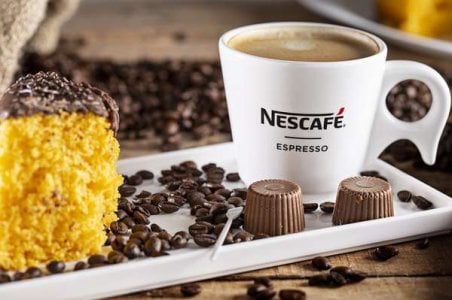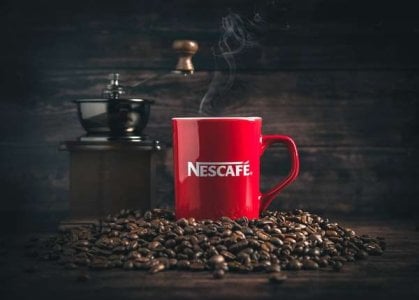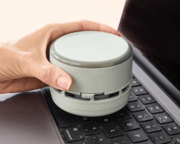Uncover secret supermarket tactics by looking at Nescafé prices at Woolworths!
You know we love a good cuppa here at the Seniors Discount Club. These days, our taste preferences span from traditional black tea to herbal options and, of course, a steaming mug of instant coffee.
Nescafé, in particular, has been a go-to choice for many of us, especially when we need the occasional caffeine boost.
In addition to keeping us alert and awake, instant coffee has become a staple for many budget-conscious households. It's common to see supermarket promotions featuring Nescafé at a discounted price.
However, an analysis of Woolworths' pricing tactics suggests that these bargains might not be as good as they seem.

Newcastle resident, Rachel King, observed a series of sharp price swings for the well-known Nescafé Gold range at Woolworths. Becoming increasingly suspicious, she documented these fluctuations.
Rachel said, 'They are playing with people—it's such a lack of respect. We all need supermarket products, so just don't screw around with customers.'
According to her findings, the 180g Nescafé Gold product could regularly be found in the 'prices dropped' campaign for around $14. However, the price would occasionally jump to $20 or $22 for a brief period before being reduced and promoted as a sale item.
For instance, in early 2023, the price shifted from $14 to $22 and was then discounted to $15. Woolworths claimed this was a sale despite being more expensive than the price charged only weeks earlier.
A spokesperson for Woolworths argued that the company endeavours to be transparent with product pricing.
They explained, 'We endeavour to be very clear in our pricing so that customers can see the benefit of the shelf price reductions in our seasonal “prices dropped” program, whether through our catalogue, in-store or online.'
Woolworths and Coles have both faced scrutiny for potentially using the pandemic and subsequent cost-of-living crisis to boost profits from sales. Critics argue that their efforts amount to inflationary profiteering.
However, the supermarket giants dispute this, stating that their promotional items protect customers from price increases.

Woolworths has also highlighted how suppliers largely fund their promotional program. A spokesperson explained, 'For each product, that funding is negotiated and agreed between Woolworths and the relevant supplier—and, if agreed, Woolworths then sells that product at a lower retail price, as part of the “prices dropped” program.'
As for Nescafé Gold, could these price swings be attributed to supplier Nestlé? Well, a spokesperson for the coffee giant said that while they have increased some supplier prices in the past 18 months, they don't control the prices at which supermarkets resell their product.
'Retailers set the price at which they resell our products to consumers, at their discretion,' the Nestlé spokesperson said.
This tangled web of pricing manipulation has led to calls for reform in the sector and increased competition, with some suggesting a government-ordered inquiry into supermarket pricing.

For us bargain lovers, this insight into the reality of supermarket pricing is frustrating and enlightening. It shows that we need to be vigilant when scanning those promotional catalogues and be aware of potential pricing tricks sneaking into our shopping trolley!
So, members, next time you fancy a Nescafé or any other product on promotion, scrutinise the price before believing you're bagging a bargain. Stay savvy, and happy shopping!
What are your thoughts on this issue? Share your opinions and insights with us!
Nescafé, in particular, has been a go-to choice for many of us, especially when we need the occasional caffeine boost.
In addition to keeping us alert and awake, instant coffee has become a staple for many budget-conscious households. It's common to see supermarket promotions featuring Nescafé at a discounted price.
However, an analysis of Woolworths' pricing tactics suggests that these bargains might not be as good as they seem.

Typically, Woolworths would have 180g Nescafé Gold on offer for around $14, but there have been occasions when they briefly hiked the price up to a staggering $22. However, they quickly rectified this by reducing the price again as part of their 'prices dropped' promotion. Image by amiraxgelcola from pixabay
Newcastle resident, Rachel King, observed a series of sharp price swings for the well-known Nescafé Gold range at Woolworths. Becoming increasingly suspicious, she documented these fluctuations.
Rachel said, 'They are playing with people—it's such a lack of respect. We all need supermarket products, so just don't screw around with customers.'
According to her findings, the 180g Nescafé Gold product could regularly be found in the 'prices dropped' campaign for around $14. However, the price would occasionally jump to $20 or $22 for a brief period before being reduced and promoted as a sale item.
For instance, in early 2023, the price shifted from $14 to $22 and was then discounted to $15. Woolworths claimed this was a sale despite being more expensive than the price charged only weeks earlier.
A spokesperson for Woolworths argued that the company endeavours to be transparent with product pricing.
They explained, 'We endeavour to be very clear in our pricing so that customers can see the benefit of the shelf price reductions in our seasonal “prices dropped” program, whether through our catalogue, in-store or online.'
Woolworths and Coles have both faced scrutiny for potentially using the pandemic and subsequent cost-of-living crisis to boost profits from sales. Critics argue that their efforts amount to inflationary profiteering.
However, the supermarket giants dispute this, stating that their promotional items protect customers from price increases.

Woolworths and Coles have faced criticism for their alleged exploitation of the pandemic and the resulting cost-of-living crisis to maximise their profits from sales. Image by Sangeeth_n from pixabay
Woolworths has also highlighted how suppliers largely fund their promotional program. A spokesperson explained, 'For each product, that funding is negotiated and agreed between Woolworths and the relevant supplier—and, if agreed, Woolworths then sells that product at a lower retail price, as part of the “prices dropped” program.'
As for Nescafé Gold, could these price swings be attributed to supplier Nestlé? Well, a spokesperson for the coffee giant said that while they have increased some supplier prices in the past 18 months, they don't control the prices at which supermarkets resell their product.
'Retailers set the price at which they resell our products to consumers, at their discretion,' the Nestlé spokesperson said.
This tangled web of pricing manipulation has led to calls for reform in the sector and increased competition, with some suggesting a government-ordered inquiry into supermarket pricing.
Key Takeaways
- Instant coffee has been a popular pandemic item, regularly featured in supermarket sales promotions.
- An analysis of Woolworths' prices of Nescafé Gold reveals occasional price bumps before being reduced and promoted as on sale.
- A Woolworths spokesperson said the company tries to be transparent with product prices and that the promotional program is significantly funded by suppliers.
- The ability of supermarkets to generate high returns during a cost-of-living crisis has prompted calls to reform the sector and increase competition.
For us bargain lovers, this insight into the reality of supermarket pricing is frustrating and enlightening. It shows that we need to be vigilant when scanning those promotional catalogues and be aware of potential pricing tricks sneaking into our shopping trolley!
So, members, next time you fancy a Nescafé or any other product on promotion, scrutinise the price before believing you're bagging a bargain. Stay savvy, and happy shopping!
What are your thoughts on this issue? Share your opinions and insights with us!







